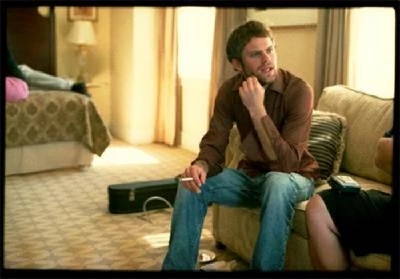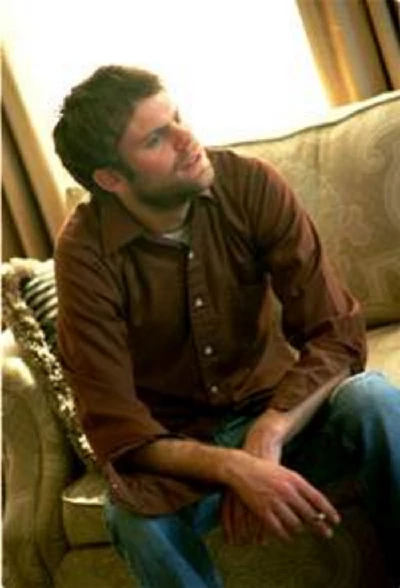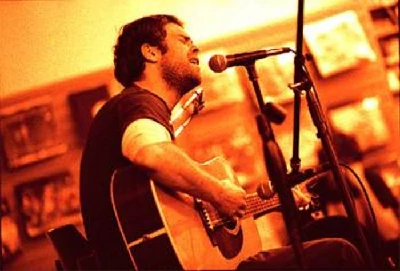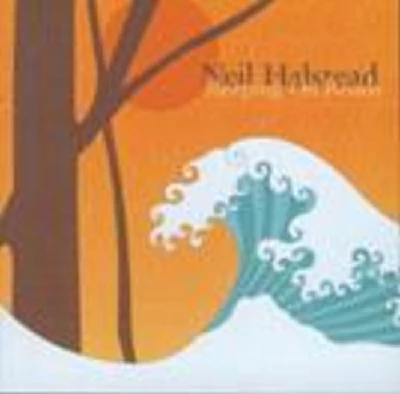published: 22 /
3 /
2002

One of the pivotal figures in British indie music, Neil Halstead was the guitarist in the influential shoegazing group Slowdive, and now fronts Mojave 3. He talks to Anthony Strutt about both bands and also his debut solo album 'Sleeping on Roads'
Article
Neil Halstead will be no stranger to many Pennyblackmusic magazine readers.
One of the pivotal figures in British independent music, he formed the influential Slowdive with his school friend Rachel Goswell in Reading when he was eighteen. Slowdive, which would eventually settle on a line-up, as well as Halstead of guitar and Goswell on vocals and guitar, of Nicholas Chaplin on bass ; Christian Savill on guitar and firstly Adrian Sell, and then Simon Scott on drums, were one of the early purveyors of the "shoegazing" dreamy pop scene. Snapped up by Alan McGee for Creation Records on the basis of their first demo tape, Slowdive recorded three albums, 'Just for a Day (1991), 'Souvlaki' (1993, three of tracks upon which were produced by Brian Eno) and 'Pygmalion' (1995). When the latter album was poorly received by both the press and public alike,the band were dropped by Creation in the middle of that year and split up shortly afterwards.
Halstead, Goswell and new drummer Ian McCutcheon, who had replaced Scott for the 'Pygmalion' sessions, however, would reconvene in the studio later that year under the new moniker of Mojave 3 to record a six song demo. In contrast to Slowdive, as Halstead was to say in an interview at the time, their new sound adopted " a completely different approach" and, described in some quarters as "country-esque", was reminiscent of acts such as Nick Drake, Leonard Cohen, the Cowboy Junkies, Tim Buckley and Bob Dylan. While Goswell was the lead singer in Slowdive, Mojave 3 also found Halstead taking over the majority of the band's vocal duties. The group, which added guitarist Simon Rowe and then keyboardist Alan Forrester (who replaced Chris Andrews, Goswell's husband, who had filled ibn on the initial demo) to its line-up, were quickly signed to a new deal with 4AD, and have since recorded three albums together , 'Ask Me Tomorrow' (1995), 'Out of Time' (1998) and 'Excuses for Travellers' (2000).
While the three Slowdive albums are, as a result of the break-up of the Creation label in 2000, all currently deleted, the three Mojave 3 albums are all readily available.
Mojave 3 recently began work on a fourth album. Halstead also released his first solo album 'Sleeping on Roads', which has a distinctive acoustic and folk emphasis, again on the 4AD label, earlier in February. In an interview, which took place just before the album was released, Pennyblackmusic spoke to him about it, and also his work both with Slowdive and Mojave 3.
PB : You recorded three albums with Slowdive, and have now recorded three albums with Mojave 3. Why did you decide choose this point to make a solo album ?
NH : I had a collection of songs and just wanted to do something a little different from Mojave 3. There was no particular reason for doing it now, other than it just felt like the right time to do it.
PB : What was your musical history prior to Slowdive ? Were you a bedsit troubadour ? Is that how you started ?
NH : Like most people, I started playing other people's songs. I started playing guitar when I was 13 and the first thing you do is to try and learn other peoples' songs. I went through my parents' record collection and learnt to play Beatles and Dylan songs.
I had never played acoustic guitar live before I did this solo album. The first time I ever went on stage with a band called the Pumpkin Fairies. We basically sounded like the Jesus and Mary Chain. I tend to usually play the acoustic guitar at home. I am one of these people who busks all day, so by the time I got to the point where I was in a band and ready to play outside of a bedroom, I was into noisy music which is how Slowdive got together.
PB : Were you at university or did you know each other anyway when you formed Slowdive ?
NH : None of us went to university. I was at school with Rachel. We started playing together in the Pumpkin Fairies which was at first me, Rachel, this other guy on bass and a guy called Adrian Sells, who was Slowdive's original drummer. We got a different bass player, Nick Chaplin, in and at some point we changed the name of the band to Slowdive. We also then got another guitarist, Christian Savill, in. Christian knew we were looking for a guitarist because he had seen us a few times in Reading, and wrote us some really nice letters asking if he could join the band. At that point he was doing a fanzine for My Bloody Valentine and I guess he liked us because we sounded like them. We were actually looking for a female guitarist, so he wrote another letter saying that he would offer to wear a dress if he could play in the band. We just said then "Fuck it ! Come on in !" That's how the band started. Shortly after that, we did a demo.
PB : You were signed really quickly, weren't you ?
NH : Yeah, we did a gig supporting 5.30 and the guy who signed them knew Alan McGee and gave him our demo tape and McGee phoned up a few days later and offered to put an EP out.
PB : You have said in the past that Slowdive were trying to sound like the Jesus and Mary Chain and My Bloody Valentine. Mojave 3 are completely different in their direction and style of music. Were you at least initially trying to sound like Nick Drake and Tim Buckley ?
NH : No, when we started Mojave 3, we were into Nick Drake, Leonard Cohen and the Cowboy Junkies, but I don't think we were consciously trying to make music like them. When we went in to record the first Mojave 3 record, we didn't have a deal or anything. We just went in there to record a few songs and with an open mind. I had written the songs on an acoustic and there happened to be a piano there in the studio, so Rachel's husband Chris Andrews (Now in Cuba, who were at one point signed to 4AD), came down and played it. We had six songs and we didn't know what to do with it. We thought about putting lots of additional stuff on it, but didn't and we put it out without any changes. As well as Nick Drake, I was also listening to lots of Patsy Cline and Hank Williams, and other really minimal stuff.
PB : As you get older, your musical tastes can change. Do you miss the loudness and ambience of Slowdive ?
NH : Yeah, sometimes I do. It's nice really. The good thing about Slowdive was that it was nice to kick out live.
PB : You worked with Brian Eno on some of the second Slowdive album 'Souvlaki'. Was that a good experience ?
NH : Yeah, it was pretty entertaining. I worked with him for about a week. The first thing that he did when he walked into the studio was to rip the clock off the wall and to put it by the mixing desk. He then said "Okay, you're going to play the guitar and I'm going to record it. I don't care what you are going to play, just play something, and then after an hour, we will work on something different". So I played the guitar for an hour. He recorded it, and then we would stop and do something else for an hour. He had a weird working method, but he was a fascinating bloke and was very funny and very clever.
PB : Are there many Slowdive songs that have gone missing or that have never been issued ?
NH : There is quite a lot of stuff, including a whole film soundtrack, that never came out.
PB : There are rumours that you brought back the rights to the Slowdive back catalogue back off Alan McGee. Is that so ?
NH : No, I haven't.
PB : Would you like to re release the Slowdive material ?
NH : I would really like the records to be readily available again. That's all I want. I spoke to Andy Bell just before he released the Ride box set (Set of 3 CDs and re releases with bonus tracks-Ed), and he was telling me that the reason they decided to do it was because they realised that, unless they got involved, then you wouldn't be able to buy a Ride album in the shops. I suppose it is something to consider.
PB : Mojave 3 are very different live and on record. One thing a lot of people say is that there isn't enough of Rachel on record. Is there a reason for that ?
NH : I think there are a lot of different reasons for all of that. Rachel does tend to sing a lot more at gigs, but I write most of the songs and so I tend to sing most of them in the studio.
PB : I believe with Slowdive that it was you and Rachel that wrote mostly everything.
NH : It was actually me that wrote most of it. There are a few things that she is credited for and there are a few things that were written by the whole band, but I wrote about 80% of the Slowdive material. At that point though, I didn't sing.
PB : Let's talk about the solo album now. Did you find these songs easier or harder to write than usual ?
NH : No, it wasn't difficult. I don't think I had a different approach. When I wrote the songs all it allowed me to do was to play in a different style of guitar, and to pick rather than to strum, which I can't really do in Mojave 3 because there isn't enough room in the songs to have that sort of guitar going through them. I like that style, and it was nice to be able to do something in it.
PB : Did you know how different you wanted it to be ? Live it still sounds like you, but on record, to be honest, it sounds like it could be someone else's record.
NH : I just wanted to make a record that was me, and where I am at on my own. When I'm playing with Mojave 3, I sing the songs and play the songs, but there are six other people doing their thing as well, and the way we sound is where is the group is. This record is just me and the things that are on it are the things that I'm into personally.
PB : Is the end result better than you expected ?
NH : No, not all. It's not quite the record I was expecting, but I'm pleased to get it done. There are certain things about it which I'm really pleased with. It was a fun record to do, and I was able to work with a lot of friends on it, especially Nick Holton of Coley Park (who are still yet to release a record and are a blues-influenced group-Ed), so that was a real pleasure.
PB : A lot of your songs are quite delicate. Do people misread you because there is a lot of pain involved in them. Do people want to mother you, or to think that this guy is a mess or a wreck ?
NH : People do have certain perceptions of you. They only know you though because of your music, so I wouldn't expect anything different.
PB : 'Sleeping on Roads', more than the Mojave 3 albums, will be branded in with the new acoustic movement. Are you happy with that ?
NH : I don't think I'd be happy with any form of branding. It's unnecessary.
PB : Do you find it harder working as a solo artist ? As it only you on stage, if you screw up, everyone can only see you.
NH : It is hard work. You are far more exposed. It is weird touring without a band. I am just treating it as a new experience.
PB : Will you do another solo album ?
NH : I hope so.
PB : You have also started on the new Mojave 3 album. Is that right ?
NH : Yeah, that's right. We have not really demoed it, but we have started recording it. I am not sure when it will be out. We have started working on it though.
PB : One thing that I have noticed about the Mojave 3 albums is that each one lasts about thirty five or forty minutes. The last album was 38 minutes. This album is 11 minutes longer. Do you think there is an ideal length for an album ?
NH : I do think there is a certain limit the brain can handle in one sitting. I grew us listening to albums, and I have always been into the idea of two sides, an A side and a B side. For me between 40 and 50 minutes is as much as I can take.
PB : Let's go quickly through the album before finishing. 'Sleeping on Roads' is more Nick Drake than Tim Buckely sounding. Would you agree ?
NH : Yeah, definitely ! I don't think it is Tim Buckley sounding.
PB : On the second track, '2 Stones in My Pocket', there's a distorted vocal. Were you mucking about in the studio when you recorded that ?
NH : I think that's just the way it was recorded. That one was recorded at home.
PB : 'Driving with Bert' ? Is that Bert Jansch ?
NH : Yeah, that was where the title was inspired from ?
PB : That one sound like early stuff by Love, doesn't it ?
NH : Yeah, I guess so. It's got that kind of slightly Mexican trumpet. We were going for a spaghetti Western vibe,
PB : Did you play the piano on 'Hi, Ho and Inbetween' ?
NH : Yeah.
PB : Would you like to do more piano ?
NH : I don't mind a tinkle. I'm a pretty shit piano player.
PB : With 'See You on Rooftops' it sounds more like the Velvets and Slowdive with a freakout at the end.
NH : That was fun to do. The idea behind that was to do a Dick Dale surf style ending. It didn't really end up that way.
PB : The whole album works really well. Thank you for your time.
NH : No problems. Thank you.
Picture Gallery:-


